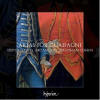Texte paru dans: / Appeared in:
* 
GRAMOPHONE (08/2012)
Pour s'abonner /
Subscription information
Hyperion
CDA67924

0034571179247 (ID236)
Reviewer: Richard Wigmore
Davies adopts the
persona of a Handel-tamed castrato
The stereotype of the 18th-century castrato is a preening
peacock enamoured of his own virtuosity and likely to throw a wobbly at the
slightest opportunity. While hardly a shrinking violet, Gaetano Guadagni
(1728-92) was revered as a generous colleague and an artist of uncommon
refinement and sensibility. He arrived in London, aged just 20, a ‘wild and
careless singer’ (Charles Burney’s words) and an actor with ‘two left feet’.
That all changed under the joint tutelage of Handel and David Garrick.
Within a few years Guadagni was feted throughout Europe for his expressive,
naturalistic acting and a style of singing that put delicacy of nuance and
subtlety of declamation above bravura histrionics.
Guadagni’s calling card in later life was Orfeo, a role Gluck and his librettist Calzabigi carefully tailored in his unique gifts. As Burney noted, he invariably drew applause for his ‘impassioned and exquisite manner of singing the simple and ballad-like air “Che farò”. The same epithets could apply in Iestyn Davies’s singing. His strong yet pure countertenor has no hint of the hootiness or epicene prissiness that often affect his breed. He phrases with natural eloquence, unexaggeratedly alive to the meaning and colour of words. Crucially, too, he never forces his high notes. The climax of ‘Che farò’ is all the more touching for its restraint.
While his watchwords were dramatic intensity and emotional truth, Guadagni could match all comers for agility. Davies is no slouch either. Spurred by Arcangelo’s fiery orchestral introduction, he balances elegance and vehemence in the coloratura flourishes of Cyrus’s ‘Destructive war’ (Belshazzar). A bellicose ‘vengeance’ aria from Arne’s Alfred goes with a comparable swing. And it’s hardly Davies’s fault that a tripping number for the distraught, vacillating Aeneas from Hasse’s Didone abbandonata sounds too cheerful for the situation — though you won’t discover the dramatic context, here and elsewhere, from Patricia Howard’s otherwise informative note.
In carping mode you might point to some
slightly flustered triplets in Didymus’s ‘The raptur’d soul’ from Theodora
— the one role Handel wrote specifically for Guadagni. But Davies silences
criticism in ‘O Lord, whose mercies’ (Saul) — the very voice of balm,
cushioned by ravishing soft strings — and in a plangent aria from Gluck’s
Telemaco, suggesting agitation just below the surface calm. Jonathan Cohen
and his crack period band (the continuo inventively varied) are ever-sensitive
and, where apt, virtuoso collaborators, and on their own find an ideal
disciplined madness in one of CPE Bach’s ever-astonishing ‘Hamburg’ symphonies.
If Davies is more closely miked than I prefer, it hardly hinders enjoyment of an
imaginative, consummately sung programme from the brightest star among young
British countertenors.
Fermer la fenêtre/Close window
Cliquez l'un ou l'autre
bouton pour découvrir bien d'autres critiques de CD
Click either button for many other reviews


